LAWSUITS NEWS & LEGAL INFORMATION
Effexor Birth Defect PPHN
Read our Effexor PPHN FAQ
Effexor (venlafaxine) is a type of antidepressant known as a serotonin and norepinephrine reuptake inhibitor (SNRI). Several studies conducted over the past few years suggest potential Effexor side effects, including Effexor birth defects such as Persistent Pulmonary Hypertension of the Newborn (PPHN). Other SNRI medications, including Pristiq, may also be linked to serious side effects.
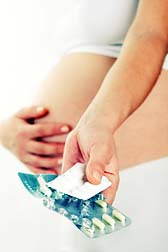 One of the more serious birth defects is Persistent Pulmonary Hypertension of the Newborn (PPHN). A study published in the New England Journal of Medicine, and cited by a recent FDA Health Advisory, found that women who took antidepressants similar to Effexor in the second half of pregnancy were six times more likely to give birth to babies who developed PPHN than women who didn't take such medications.
One of the more serious birth defects is Persistent Pulmonary Hypertension of the Newborn (PPHN). A study published in the New England Journal of Medicine, and cited by a recent FDA Health Advisory, found that women who took antidepressants similar to Effexor in the second half of pregnancy were six times more likely to give birth to babies who developed PPHN than women who didn't take such medications.
PPH and PPHN
Primary Pulmonary Hypertension (PPH) is a disorder of the lungs in which the arteries are severely restricted. This causes the blood pressure in the pulmonary artery to rise to high levels. As a result, blood flow is restricted and oxygen levels in the blood are decreased.
Infants born with PPHN do not process oxygen in the same way as infants born without it. While the baby is in the womb, blood circulation is controlled by the placenta, which supplies oxygen to the baby through the umbilical cord rather than through the lungs. The pulmonary artery sends blood directly back to the heart through the ductus arteriosus.
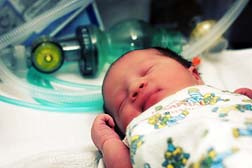 After birth, circulation switches from the ductus arteriosus, which then permanently closes, to the lungs. However in babies born with PPHN the ductus arteriosus remains open. This prevents the blood flow from entering the lungs, which in turn means that blood returning to the heart is very low in oxygen. Due to the lack of oxygen, the infant's organs become stressed.
After birth, circulation switches from the ductus arteriosus, which then permanently closes, to the lungs. However in babies born with PPHN the ductus arteriosus remains open. This prevents the blood flow from entering the lungs, which in turn means that blood returning to the heart is very low in oxygen. Due to the lack of oxygen, the infant's organs become stressed.
Symptoms of PPHN include rapid breathing, rapid heart rate, difficulty breathing, and bluish skin. Heart murmurs and low oxygen levels in the baby's blood are also indicators of PPHN.
Side Effects of PPHN
Even with treatment, infants born with PPHN can experience shock, heart failure, brain hemorrhage, seizures, kidney failure, organ damage, and death. Approximately 20 percent of babies born with PPHN do not survive. Those who do survive may have long-term problems such as breathing difficulties, seizures, developmental disorders, and hearing loss.
In addition to PPHN, the FDA Patient Information Sheet on Effexor notes that babies whose mothers have taken Effexor while pregnant suffer withdrawal symptoms including agitation, insomnia, and difficulty feeding.
Concerns about antidepressants are serious enough that on July 19, 2006, the FDA issued a public health advisory about the medications and asked makers of the drugs to change their prescribing information to include the risk of PPHN.
Effexor is listed as pregnancy Category C by the FDA. This means that animal studies have shown a risk to the fetus but human studies do not indicate whether the risk of birth defects is greater than the risk involved in discontinuing the medication. Effexor can be transferred through breast milk and may harm a nursing baby.
The FDA is currently seeking more information on the risks associated with taking antidepressants while pregnant.
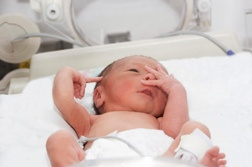 Women who are taking Effexor and are pregnant or thinking about becoming pregnant should consult with their doctor immediately. Women who are breast-feeding and taking Effexor should also discuss their options with their doctors to determine whether or not to continue taking Effexor.
Women who are taking Effexor and are pregnant or thinking about becoming pregnant should consult with their doctor immediately. Women who are breast-feeding and taking Effexor should also discuss their options with their doctors to determine whether or not to continue taking Effexor.
Other birth defects reportedly linked to SSRIs and SNRIs:
Effexor is a serotonin-norephinephrine reuptake inhibitor (SNRI). It is different than drugs that are in the SSRI (selective serotonin reuptake inhibitors) category. Effexor works by increasing the levels of two neurotransmitters in the brain: serontonin and norepinephrine. Antidepressants in the SSRI category act selectively on serotonin.
Pristiq (desvenlafaxine) is another SNRI. It is used to treat major depressive disorder and is manufactured by Pfizer. Because Pristiq is an SNRI it may involve side effects similar to those of other SNRI medications.
Last updated on
En Español EFFEXOR HPPR DEFECTOS DE NACIMIENTO
FREE EFFEXOR PPHN LAWSUIT EVALUATION
Send your Effexor PPHN claim to a lawyer who will review your claim at NO COST or obligation.
GET LEGAL HELP NOW
GET LEGAL HELP NOW
Effexor and PPHN
 One of the more serious birth defects is Persistent Pulmonary Hypertension of the Newborn (PPHN). A study published in the New England Journal of Medicine, and cited by a recent FDA Health Advisory, found that women who took antidepressants similar to Effexor in the second half of pregnancy were six times more likely to give birth to babies who developed PPHN than women who didn't take such medications.
One of the more serious birth defects is Persistent Pulmonary Hypertension of the Newborn (PPHN). A study published in the New England Journal of Medicine, and cited by a recent FDA Health Advisory, found that women who took antidepressants similar to Effexor in the second half of pregnancy were six times more likely to give birth to babies who developed PPHN than women who didn't take such medications.
PPH and PPHN
Primary Pulmonary Hypertension (PPH) is a disorder of the lungs in which the arteries are severely restricted. This causes the blood pressure in the pulmonary artery to rise to high levels. As a result, blood flow is restricted and oxygen levels in the blood are decreased.
Infants born with PPHN do not process oxygen in the same way as infants born without it. While the baby is in the womb, blood circulation is controlled by the placenta, which supplies oxygen to the baby through the umbilical cord rather than through the lungs. The pulmonary artery sends blood directly back to the heart through the ductus arteriosus.
 After birth, circulation switches from the ductus arteriosus, which then permanently closes, to the lungs. However in babies born with PPHN the ductus arteriosus remains open. This prevents the blood flow from entering the lungs, which in turn means that blood returning to the heart is very low in oxygen. Due to the lack of oxygen, the infant's organs become stressed.
After birth, circulation switches from the ductus arteriosus, which then permanently closes, to the lungs. However in babies born with PPHN the ductus arteriosus remains open. This prevents the blood flow from entering the lungs, which in turn means that blood returning to the heart is very low in oxygen. Due to the lack of oxygen, the infant's organs become stressed.
Symptoms of PPHN include rapid breathing, rapid heart rate, difficulty breathing, and bluish skin. Heart murmurs and low oxygen levels in the baby's blood are also indicators of PPHN.
Side Effects of PPHN
Even with treatment, infants born with PPHN can experience shock, heart failure, brain hemorrhage, seizures, kidney failure, organ damage, and death. Approximately 20 percent of babies born with PPHN do not survive. Those who do survive may have long-term problems such as breathing difficulties, seizures, developmental disorders, and hearing loss.
In addition to PPHN, the FDA Patient Information Sheet on Effexor notes that babies whose mothers have taken Effexor while pregnant suffer withdrawal symptoms including agitation, insomnia, and difficulty feeding.
Concerns about antidepressants are serious enough that on July 19, 2006, the FDA issued a public health advisory about the medications and asked makers of the drugs to change their prescribing information to include the risk of PPHN.
Effexor is listed as pregnancy Category C by the FDA. This means that animal studies have shown a risk to the fetus but human studies do not indicate whether the risk of birth defects is greater than the risk involved in discontinuing the medication. Effexor can be transferred through breast milk and may harm a nursing baby.
The FDA is currently seeking more information on the risks associated with taking antidepressants while pregnant.
 Women who are taking Effexor and are pregnant or thinking about becoming pregnant should consult with their doctor immediately. Women who are breast-feeding and taking Effexor should also discuss their options with their doctors to determine whether or not to continue taking Effexor.
Women who are taking Effexor and are pregnant or thinking about becoming pregnant should consult with their doctor immediately. Women who are breast-feeding and taking Effexor should also discuss their options with their doctors to determine whether or not to continue taking Effexor.
Other birth defects reportedly linked to SSRIs and SNRIs:
- Neural-tube defects (brain and spinal cord)
- Craniosynostosis (abnormally shaped skull)
- Infant omphalocele (abdominal wall defects)
- Club foot (one or both feet turn downward and inward)
- Anal atresia (complete or partial closure of the anus)
- Cleft lip and cleft palate
Effexor is a serotonin-norephinephrine reuptake inhibitor (SNRI). It is different than drugs that are in the SSRI (selective serotonin reuptake inhibitors) category. Effexor works by increasing the levels of two neurotransmitters in the brain: serontonin and norepinephrine. Antidepressants in the SSRI category act selectively on serotonin.
Pristiq (desvenlafaxine) is another SNRI. It is used to treat major depressive disorder and is manufactured by Pfizer. Because Pristiq is an SNRI it may involve side effects similar to those of other SNRI medications.
Effexor PPHN Birth Defect Legal Help
If your child was born with PPHN or later developed PPH, and you took Effexor during pregnancy, a lawyer may be able to help. Please click the link below to submit your Effexor birth defect complaint to a lawyer for a free evaluation.Last updated on
EFFEXOR PPHN LEGAL ARTICLES AND INTERVIEWS
Studies Suggest SSRI Side Effects but Do they Extend to Effexor?
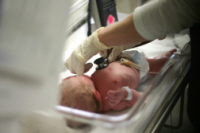
Could Painkillers Reduce Effexor's Effectiveness?

Did Effexor Cause Matthew's Death? The Questions Continue
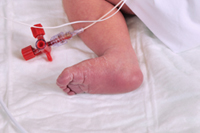

August 27, 2012
Recent studies have suggested that SSRI side effects can affect infants, but questions remain about whether the same is true for Effexor side effects. Effexor is not an SSRI (selective serotonin reuptake inhibitor), it is an SNRI (serotonin-norepinephrine reuptake inhibitor), so although there could be a risk of Effexor birth defects similar to those found with SSRI medication, less research has been done on these risks. READ MORE
Could Painkillers Reduce Effexor's Effectiveness?

May 23, 2011
Although some people are concerned about the risk of Effexor side effects, including a reported increased risk of Effexor birth defects, many people do not question whether or not antidepressants such as Effexor are effective. Some studies, however, suggest that antidepressant medications are only slightly better than a placebo at treating depression, while other studies suggest that taking various medicines at once lowers the effectiveness of the antidepressants. All this makes it more difficult to determine whether the risks of Effexor side effects are worth the benefits. READ MORE
Did Effexor Cause Matthew's Death? The Questions Continue

April 17, 2011
A little under two months ago, Matthew Schultz would have celebrated his second birthday. Two years of life for the child of a British Columbia family in Canada. However, Matthew never made it to two years. The sad reality is that Matthew lived only two hours when he was born on February 21, 2009. His mother had been prescribed Effexor. The suspicion is that Matthew died due to Effexor birth defects. READ MORE
READ MORE Drugs/Medical Settlements and Legal News

READER COMMENTS
Maine
on